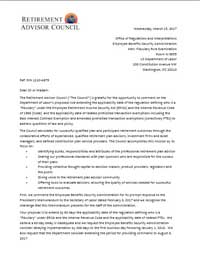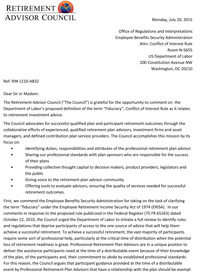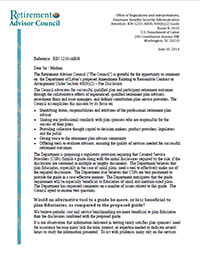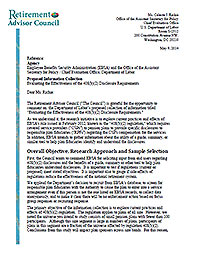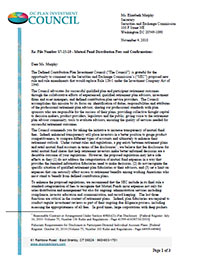Retirement Advisor Council Comment Letters
March 15, 2017
The Council commends the Employee Benefits Security Administration for its prompt response to the President’s Memorandum to the Secretary of Labor dated February 3, 2017 and recognizes the challenge that this Memorandum presents for the staff of the Administration.
The proposal is to extend by 60 days the applicability date of the regulation defining who is a “fiduciary” under ERISA and the Internal Revenue Code and the applicability date of related prohibited transaction exemptions (PTEs.) The Council believes a 60-day delay is inadequate and requests the Employee Benefits Security Administration consider delaying implementation by 266 days to the first business day following January 1, 2018. The Council also requests that the Department consider extending the period for providing comments to August 8, 2017. Comments articulate the rationale for the requests.
July 20, 2015
The Council commends the Employee Benefits Security Administration for taking on the task of clarifying the term “fiduciary” under the Employee Retirement Income Security Act of 1974 (ERISA). To achieve a successful retirement, the vast majority of participants require some sort of professional help, particularly at the critical time of distribution when the potential loss of retirement readiness is great.
Professional Retirement Plan Advisors are in a unique position to deliver the assistance participants need at the time of a distributable event because of their knowledge of the plan, of the participants and, their commitment to abide by established professional standards. For this reason, the Council argues that participant guidance provided at the time of a distributable event by Professional Retirement Plan Advisors that have a relationship with the plan should be exempt from prohibited transaction status. The current proposal gives close attention to this issue and we are grateful for the clarifications.
On the other hand, the Council believes the final regulation needs to be enhanced from the current proposal in nine areas:
- Recognize the full scope of the fiduciary duties of a Professional Retirement Plan Investment Advisor
- Acknowledge that the evaluation of investment options involves more than price comparison
- Overcome the preconceived notion that advisors are necessarily conflicted
- Acknowledge that fiduciary investment advice is a process delivered over time, not a one-time transaction
- Modify the proposed Best Interest Contract exemption so the contract is required only at the time of transaction
- Expand on the distinctive practices for small plans and large plans
- Recognize the full scope of participant education including investment product information, and QDIAs that mirror asset allocation models
- Expand on the situation of plan sponsors who do not use the services of a fiduciary plan advisor and rely exclusively on the services of their recordkeeping service provider for investment advice, investment array construction, participant education or participant advice
- Address the impact (if any) of sub-transfer agent compensation for providing shareholder services on the fiduciary status of investment managers
March 15, 2011
"There is ample evidence that individuals who work with a professional advisor enjoy better retirement outcomes than participants left to their own devices. Current and proposed regulations however can prevent the advisor to a retirement plan from also providing advice to individual participants if that advisor receives compensation from that advice. Of particular concern is participants’ ability to access advice from the person they know well, who can help them most when they separate from service to retire: the advisor to the plan."


